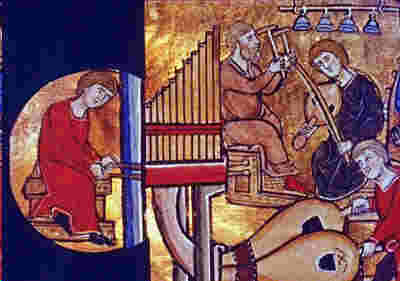
Welcome to music of the first world war Era—Page 3
in flew enza
Flu was not restricted to the troops. At least 550 thousand
American civilians perished of flu in the ten months prior to the end of
hostilities in November, 1918. Doctors and public health officials were
helpless to prevent the illness or alleviate suffering. People walked the
streets wearing cloth masks for protection, but porous masks were useless
against a virus-borne disease. Many fell where they stood on corners or in schools or
offices only to be carried away to a hospital and die that night or one or two days
later, drowning from lungs filled with their own blood. Whole families were wiped out in a matter of days. Virtually no one
was spared the loss of a family member, friend, or acquaintance. Newspapers
were comparing the epidemic to the Black Plague. Sinister accusations were
made against the Kaiser by those who held that the Germans had planted the
flu as an act of biological warfare.
Wartime conditions exacerbated the calamity because of overcrowding; many more became sick than
otherwise might have. People had to work in together in factories and
offices; they traveled throughout the U.S. on war-related missions, carrying
diseases. The disaster struck small towns and backwoods villages
as hard or harder than population centers. Recruits who signed up in hamlets
mingled in training camps with draftees from the big city and took leave in
exciting places that prior to the war they'd only dreamed about visiting.
Ironically, contraction and mortality
rates were highest among those in the prime of life—those
of draft age—vigorous and healthy men and women with the most to look
forward to in life.
Throughout the final months of the war the public read
constantly of the pandemic in newspapers, but gatherings like parades and
wartime rallies continued; the war had to come first. They put on a brave
face and carried on, despite the knowledge that people were dying. Troops continued to be
drafted into crowded training camps and shipped abroad on crowded troop
carriers; no other course
could be considered. The public suffered along with the troops and without
complaint. They seemed to accept their lot almost in silence.
Ordinarily, one expects a scourge like the flu epidemic to find its way
into music. Although war songs like Over There were played and sung
everywhere, oddly the only noteworthy music to come out of the influenza
experience was a child's singsong verse set to the vapid rhythm of a skip
rope. It went:
I had a bird,
Its name was Enza,
I opened the window,
And in flew Enza.
|
Overnight in 1918, the flu became a worldwide pandemic. Tens of thousands of American
civilians were dying of it, even as the war raged on overseas. English
civilians and military personnel caught it from American soldiers shipped to
their country. American soldiers probably gave it to the German troops
they opposed; it decimated their ranks. The German army accused the
Americans of intentionally infecting them. theyin turn gave it to the German civilian population.
Troops and civilians of many nations and continents carried it with them to
outposts and back home.
All told, at least 30 million, mostly civilians, died of the flu all over
the world in places as far removed from the battlefront as South Africa, the
West Indies, Canada, and New Zealand. Some estimates put the death toll
among civilians at 50 million. By the time the great flu epidemic of
1918 began to fade in the U.S. in November, the disease had infected most of the
human species. By comparison, 8-1/2 million soldiers were killed in combat.
No wonder the War was a breeding ground for social upheaval. At the war's
start, Americans believed that science and industry could reach almost any
heights and Americans could accomplish anything they set their minds to. The European war was a temporary setback. Once American troops set foot in
Europe, it wouldn't be long before they would easily turn the tide of
battle. Then America could get on with fulfilling its rightful destiny.
The War was a rude awakening; 1918 put an end to optimism. Science and
industry had failed to stop the influenza epidemic and had created poison
gas, tanks, airplanes, and machineguns. Monarchy, despotism, and the old
ways had been swept aside but what was to take their place? Millions had
died for a lost cause, or worse, for no cause. A generation of brilliant men
and women had been decimated. The physically and mentally maimed were
condemned to hobble in the streets for the rest of their lives. The economy
of Europe was a shambles. Life was cheap.
As a result of their war experiences and the social upheaval of the time,
the generation of men and women who came of age during or immediately
following World War I became cynical, disillusioned, and without cultural or
emotional stability. theybecame known as the Lost Generation. They were to
number among them people like American writers Ernest Hemingway, F. Scott
Fitzgerald, and John Dos Passos. To them, life was a vacuum. That the old
world had died was a certainty; they knew of nothing that could take its
place. If a new age was dawning, no one could quite tell what it might
bring.
ETAF Recommends
...Coming.
—Page 1,
2,
3,
4,
5—


